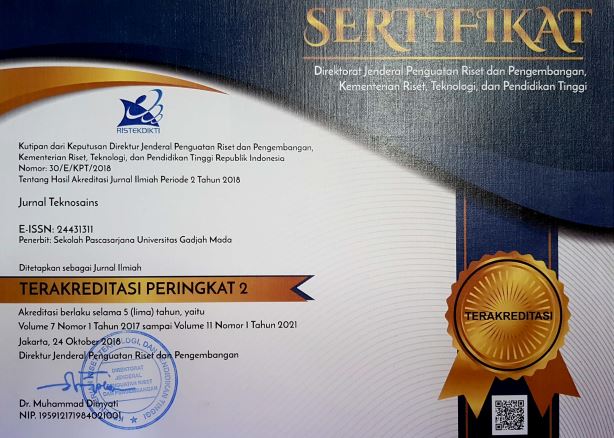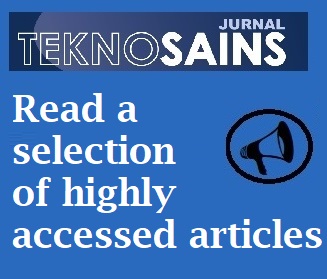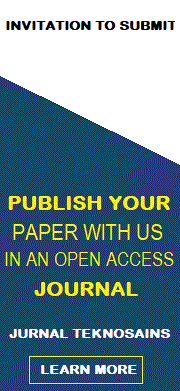APLIKASI STRUCTURAL EQUATION MODELLING (SEM) PADA KAJIAN PENGARUH KELEMBAGAAN, MODAL SOSIAL JIWA KEWIRAUSAHAAN TERHADAP KINERJA USAHA BUDIDAYA IKAN NILA DI KABUPATEN SLEMAN
Ratna Dewi Mulyaningtiyas(1*)
(1) UGM
(*) Corresponding Author
Abstract
Keywords
Full Text:
PDFReferences
BPS.2014. 2014. Tabel Dinamis Produksi Ikan Darat menurut Jenis Budidaya dan Kabupaten/Kota di D.I. Yogyakarta (Ton). Website. . Diakses pada 21 Maret 2018, pk. 15.10 WIB.
Creswell, John W. 2015. Research Design Pendekatan Kualitatif, Kuantitatif, dan Mixed. Pustaka Pelajar. Yogyakarta
Fauzan, M. 2002. Peningkatan Kinerja Dosen Berbasis Modal Sosial dan Dukungan Organisasional di PTS Kota Semarang. Jurnal Bisnis dan Ekonomi (JBE), September 2012, Hal. 188 – 202 Vol. 19, No. 2 ISSN: 1412-3126
Fukuyama. F. 2014. The Great Distruption. Qalam. Yogyakarta
Georgellis, Y., Joyce, P. and Woods, A.. (2000). “Entrepreneurial Action, Innovation, and Business Performance : The Small Independent Business”. Journal of Small Business and Enterprise Development 7(1): 7-17.
Gray, C. (2002). “Entrepreneurship Resistance to Change and Growth in Small Firms”. Emerald Journal of Small Business and Enterprise Development 9(1)
Hira, A dan Ron Hira (2000). The Institutionalism: Contradictory Notions of Change. American Journal of Economics and Sociology. Vol.59, No.2, April: 267-282
Kao, J. 2001. Entrepreneurship, Creativity, and Organization. Prentice Hal. New Jersey.
Nugroho,S.P. dan Setyawan, A.A. 2015. Pemoderasian Modal Sosial pada pengaruh Orientasi Entrepreneur terhadap Peningkatan Kinerja Organisasi (studi empiris pada UKM di Kota Surakarta). BENEFIT Jurnal Manajemen dan Bisnis. Volume 19, Nomor 1, Juni 2015, hlm 80-94
Permadi, D.C. 2002. Analisis Pengaruh Modal Sosial Organisasi dan Modal Intelektual Organisasi terhadap Keunggulan Organisasi.Tesis Magister Manajemen IPB.
Riduwan, 2002. Skala Pengukuran Variabel-Variabel Penelitian. IKAPI. Jawa Barat
Ruttan, V.W. 1984. Models of Agricultural Development, dalam C.K. Eicher& J.M.Staatz (eds). Agriculture Development in The Third World. The John Hopkins University Press. Baltimore, London: 38-45
Siregar. 2011. Modal Sosial Para Pedagang Kaki Lima Etnis Jawa Studi di Daerah Nagoya Kota Batam. Jurnal Fisip UMRAH. Vol 1(1): 93-106
Solimun.2009. Permodelan Persamaan Struktural Berbasis SEM, UM Press Malang
Stam,W. Arzlanian, S. Elfring, T. 2014. Social capital of Entrepreneurs and small firm perfomance: A meta-analysis of contextual and methodological moderators. Journal of Business Venturing 29 (2014) 152-173.
Suryana. 2014. Memahami Karakteristik Kewirausahaan, Modul, Depdiknas. Jakarta.
Zhao,Y. 2012. Measuring the Social Capital of Laid-off Chinese Workers.Current Sociology, 50,4,555-71.
Article Metrics
Refbacks
- There are currently no refbacks.
Copyright (c) 2018 Ratna Dewi Mulyaningtiyas

This work is licensed under a Creative Commons Attribution-ShareAlike 4.0 International License.
Copyright © 2024 Jurnal Teknosains Submit an Article Tracking Your Submission
Editorial Policies Publishing System Copyright Notice Site Map Journal History Visitor Statistics Abstracting & Indexing









